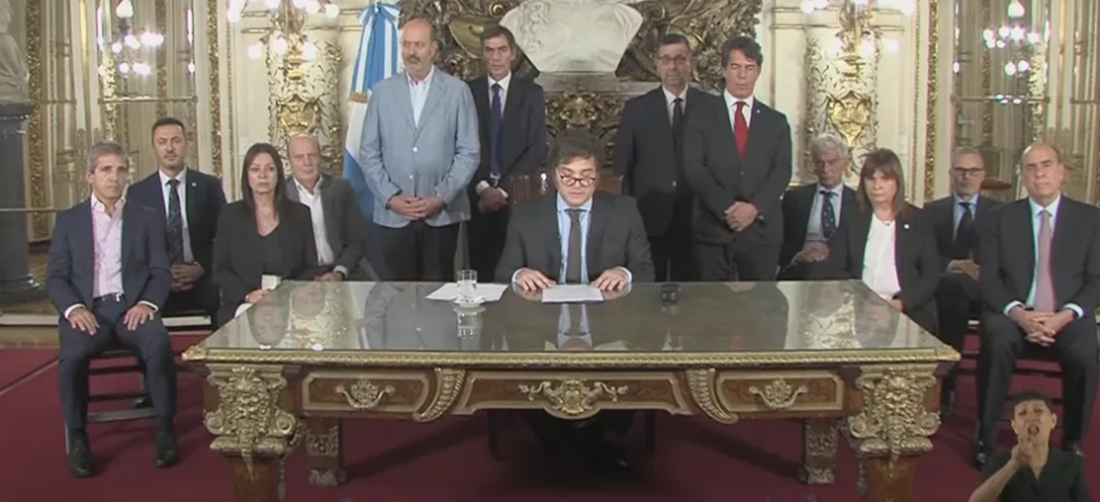
Milei announces decree to deregulate economy and boost exports in Argentina
Dec, 21, 2023 Posted by Gabriel MalheirosWeek 202346
Argentina’s new president, Javier Milei, announced on December 20 the Urgency and Necessity Decree (DNU), enabling the economic deregulation of the country. The decree, effective from December 21, modifies or revokes over 350 regulations and was published in the Official Gazette.
Among other points, the decree deregulates satellite internet service and private healthcare, flexibilizes the labor market, and revokes several national laws. The measures also include converting various state-owned companies into joint-stock companies, facilitating the privatization of these institutions.
The announcement came days after the Ministry of Economy unveiled the so-called “Chainsaw Plan,” a package of bold economic measures to contain expenses and improve Argentina’s economic landscape.
Constitutional lawyers interviewed by the Argentine newspaper La Nacion argued that the Urgency and Necessity Decree (DNU) does not meet the requirements of the Argentine National Constitution. The experts stated that Milei had exceeded his powers, encroaching on Congress’s competencies, and further noted that the decree had not passed through the country’s Supreme Court jurisprudence filter.
Validity of the measures
The measures were enacted through the Urgency and Necessity Decree (DNU), a type of order that, in Argentina, can be issued by the president on specific occasions and does not require Congress approval. Thus, the text is effective from its publication in the Official Gazette.
As per the legislation, in the coming days, the DNU will be sent by Milei’s office to a bicameral commission that will analyze the text. The group’s conclusions will then be sent to Congress.
For the measures to be rejected, they must be disapproved by the Chamber of Deputies and the Senate, explained by Emiliano Vitaliani, a constitutional lawyer, to AFP.
“This is just the first step; in the coming days, we will convene extraordinary sessions of the National Congress and send a package of laws asking for collaboration from Congress to advance in this change process,” said Milei.
Announced measures
Among the measures announced by Milei are:
- Repeal of the Rental Law.
- Repeal of the Supply Law.
- Repeal of the Gondola Law.
- Repeal of the National Purchases Law.
- Repeal of the Price Observatory of the Ministry of Economy.
- Repeal of the Industrial Promotion Law.
- Repeal of the Commercial Promotion Law.
- Repeal of the regulation preventing the privatization of public companies.
- Repeal of the state companies regime.
- Transformation of all state-owned companies into joint-stock companies for subsequent privatization.
- Modernization of the labor regime to facilitate job creation.
- Customs Code reform to facilitate international trade.
- Repeal of the Land Law.
- Modification of the Firefighting Law.
- Repeal of sugar mills’ production obligations.
- Liberation of the legal regime applicable to the wine sector.
- Repeal of the national mining trade system and the Mining Information Bank.
- Authorization for the total or partial transfer of shares of Argentine airlines.
- Implementation of the open skies policy.
- Modification of the Civil and Commercial Code to reinforce the principle of contractual freedom between parties.
- Modification of the Civil and Commercial Code to ensure that contractual obligations in foreign currency are paid in the agreed currency.
- Modification of the pre-paid medicines and social works regulatory framework.
- Elimination of price restrictions in the pre-paid industry.
- Incorporation of pre-paid medicine companies into the social works system.
- Establishment of electronic medical prescriptions.
- Modifications to the pharmaceutical companies’ regulatory framework to promote competition and reduce costs.
- Amendment of the Companies Law to allow football clubs to become corporations.
- Deregulation of satellite internet services.
- Deregulation of the tourism sector.
- Incorporation of digital tools for automotive registration procedures.
Crisis
Argentina is experiencing one of its worst economic crises in recent history, with 40% of the population living in poverty and inflation surpassing 140% annually. Milei has stated that public spending cuts will equal 5% of the country’s Gross Domestic Product (GDP).
The Argentine government spokesperson, Manuel Ardoni, had previously mentioned a “strong fiscal cut,” focusing on social revenues, and stated that the package designed by Caputo and Milei aims to “prevent a greater catastrophe.”
“We understand that the situation is serious, and we are aware that the situation could be worse,” declared Adorni.
In the morning, the spokesperson also announced that, for a year, all government statements to the press will be made through recorded videos, which will be shown to journalists in a room at the Casa Rosada without the possibility of questions.
-
OTI Rankings
Dec, 03, 2018
0
Biosev SA plans to sell nine production units
-
OTI Rankings
Dec, 03, 2018
0
Brazil’s sugar production hit 10 year low
-
Grains
Dec, 03, 2018
0
Mato Grosso plants 90% of its soybean crops
-
Ports and Terminals
May, 04, 2023
0
Port of Montevideo handles over 2,200 containers



